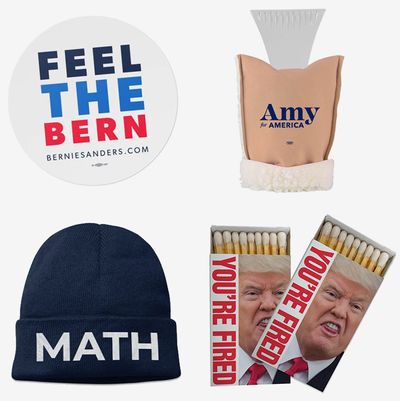
Pete Buttigieg needed the support of black voters to win the Democratic primaries. At debates and town halls, the presidential contender was taken to task for his record of racial inequality as mayor of South Bend, Indiana. The politician largely disputed these accusations; meanwhile, his staffers reconfigured the campaign’s online store to feature a $27 “Invest in Black America” shirt on its landing page, styled with colors typically associated with the African diaspora.
Andrew Yang was partially financing his presidential run by capitalizing on the Yang Gang, selling swag for $30, including “Math” beanies and limited-edition apparel featuring the entrepreneur as a young emo rocker à la Blink-182. What remains of the merchandise is being sold at steep discounts, and will likely help soften any debts the candidate has post-campaign.
Rising in the ranks, Senator Amy Klobuchar promulgated a message of midwestern pragmatism in her online offerings, selling swag that includes a $10 ice scraper and a $12 tea towel imprinted with her famous hot dish recipe.
Whether these attempts at political branding were effective on their own terms is uncertain, but it is clear that they were not enough to help their candidates seriously contend for the nomination.
Over the last few decades, political marketing has become a multibillion-dollar industry, and campaign managers have increasingly looked to merchandise as a powerful branding tool capable of conveying a politician’s platform. The increased ingenuity of swag follows in the footsteps of President Donald Trump, whose ability to transform “Make America Great Again” into a $45 million market demonstrates the fundraising opportunities of political trinkets and the influence such brands wield over voters. In other words, the days of discreet buttons and yard signs are over.
But this election cycle, Democrats have struggled to effectively market themselves vis-à-vis their Republican opponent. And experts say that a protracted, contested primary has so far hampered their ability to create brand recognition as robust as Trump’s.
According to Bruce Newman, a marketing professor at DePaul University and editor-in-chief of the Journal of Political Marketing, such branding succeeds when traditional media magnifies one candidate over another. “After the Democratic National Convention, it’s only a matter of months for a candidate to identify a brand, reinforce it, and promote it before the general election,” he said. “Compare that to a president who has been defining his brand during his four years in office and well before that.”
From a marketing perspective, then, that Bernie Sanders is currently leading the primaries is unsurprising. The senator has consistently stuck to a social democratic platform of free health care and college since running for president in 2016. The Sanders campaign has succeeded thus far because it prioritizes the gradual shaping of voter attitudes more than crafting an image of its candidate. On the other hand, Joe Biden’s campaign has revived itself despite a more diffuse message about the vice-president’s electability and experience rather than sticking to one particular vision for the country.
This messaging plays out in the candidates’ stores. Best-selling items from the Sanders campaign include a $27 shirt reading, “College for all. Medicare for all. Jobs for all. Justice for all.” Biden’s top selections have no platform parallels, instead focusing on vague bromides like “There is nothing beyond our capacity” and “We choose unity over division.”
And as the field continues to narrow, candidates are taking their ideological battles to the gift shop. Ever the businessman, Bloomberg has translated his increasingly frequent attacks on Sanders into a marketing slogan, and in the last week has debuted a baseball cap with the words “Not a Socialist” written in bold, white capital letters — all for the patriotic price of $17.76. The sold-out product’s description also claims that twice as many Americans have a positive impression of capitalism than socialism, according to a 2019 Pew Research survey. (That’s true of the general population, but the poll actually showed most Democrats favoring socialism over capitalism.) Other products from the billionaire’s shop attack Trump with satirical takes on the president’s coiffed comb-over and catchphrase.
By comparison, Tom Steyer tried to double down on his popularity with black voters ahead of the South Carolina primary, where his campaign has already spent more than $14 million to court the voting bloc. That focused investment is evident in the candidate’s store, which is now selling $22 shirts at the top of its landing page that say “Reparations Are Past Due,” “Invest in HBCUs,” and “African Americans for Tom Steyer.”
And merchandise is what remains when candidates fail to find their path to the presidency, leaving clues as to where a campaign went wrong. Klobuchar’s momentum in the early primaries sputtered once she left the Midwest. Apparently, crowds in Nevada and South Carolina didn’t have a taste for her campaign colors, which the senator herself once jested were cribbed from Hidden Valley ranch dressing.





























